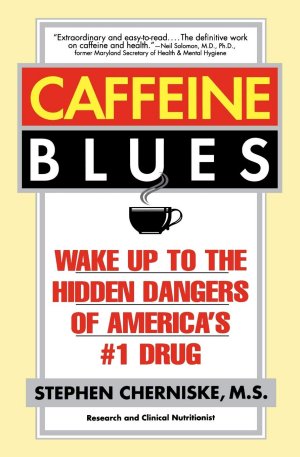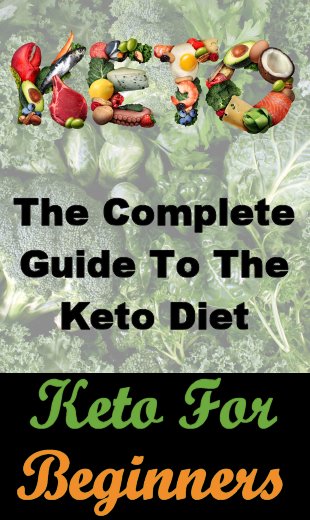Caffeine Blues – My Thoughts On This Controversial Book
I have mentioned coffee and, more specifically, caffeine, many times in other articles, and I have been somewhat ambivalent about whether I think it is good for you or not.
In the USA, and other countries (e.g. Canada, Denmark, Finland), it is practically a national obsession, and there are people who say they could not make it through the day without their (multiple cups of) coffee.
There are even studies that purport to show all sorts of health benefits of this popular beverage – but is coffee really something you should be drinking?
In my quest to discover more about coffee, and the ingredient that is in question, i.e. caffeine, I found a book called Caffeine Blues, by Stephen Cherniske, M.S.
I actually first came across it a few months ago, and was dissuaded from buying it because of some of the critical reviews on Amazon.
For example, one person said that there were no studies to back up what the author was claiming.
Another said that the author was misrepresenting the studies that he did reference.
And another person said the information was outdated and you should read more recent books by authors who the reviewer said are caffeine experts. (Having said that, the person writing that review is the co-author of both of those other books, which were only written three to four years later, and he serves many Fortune 500 companies, including those in the pharmaceutical niche, so it would be difficult to say that he’s 100% impartial.)
However, I saw other people mentioning, both on Amazon, and elsewhere, how good the book was, so I decided to take the plunge and read it.
If you want an ultra-short review, then the author is saying that caffeine is bad for you in all sorts of ways, including both physically and mentally.
So, what else can I say about this book?
Well:
- In spite of the Amazon review that mentioned a lack of referenced studies, I counted around 600 of them, so maybe that list of studies was not included in the copy he bought in 2014. Or maybe the person chose to ignore them for the sake of the review – it’s impossible to discern the motives at this stage.
- One reviewer said that she needed caffeine to keep her awake while she read it, but that was nowhere close to my experience of the book. At 451 pages, then yes, it is a longish book, but maybe that’s because there are lots of areas to cover – and given that caffeine is consumed in such large quantities by so many people, it requires more discussion to help people see through the lens of their addiction. But to call the book sleep-inducing is, for me, overstating it considerably – it was a thoroughly enjoyable book that did not drag, at all.
- As one reviewer said, there are a lot of typos in the book, and hyphens in weird places, and while I too found that jarring, I think that’s the result of converting a book that was written in pre-Kindle days to a Kindle format. I cannot say whether those same errors are present in the paperback version or not – the typos probably are, but the stray hyphens are likely not an issue in that format.
- I think what’s interesting (and worrying) is the large number of adverse effects that appear to be the result of caffeine. There are physical ones, such as problems with your heart, insomnia, kidneys, and liver, and mental ones, including anxiety, cognitive functions, depression, and stress. The list is, of course, much longer than that.
- He covers some of the common caffeine myths (e.g. that it gives you a lift, sharpens your mind, and gives you energy), and points out how some of the studies that purport to demonstrate the health benefits of coffee / caffeine are, in fact, not telling the entire story.
- Although the book focuses mainly on coffee, it’s worth pointing out that there are other sources, most notably tea and chocolate, as well as many supplements that contain caffeine or caffeine-type ingredients.
- I like the fact that there is a chapter devoted to alternatives to coffee and tea. This sort of goes hand in hand with his Off The Bean program, which he says has been successfully tested on many of his patients. This program is designed to help people wean themselves off coffee, but in a way that does not force you to endure withdrawal symptoms – yes, caffeine can be addictive and therefore just as hard to cut out as other types of drug.
- While there are a few critical reviews of this book, there are far more singing its praises, including some by people who have reduced or eliminated coffee from their diet and discovered the very benefits discussed in the book.
All in all, I really enjoyed this book, finding it interesting and informative, even shocking, and for a non-fiction book, it’s as close to a page-turner as you’ll find.
The Author’s Company
Book aside, I was a little bit concerned to discover that the author’s company, MAXCELL BIOSCIENCE, INC, fell foul of an FTC violation, which appears to have been related to making claims about various supplements he used to sell. The fact that the company’s website no longer exists suggests that the complaint was upheld.
Having said that, making claims that the FTC deemed unsubstantiated does not necessarily equate to being wrong about caffeine.
On the one hand, you might say it calls into question his character, but on the other, it’s well known in the supplement industry that the government (specifically the FDA but no doubt other departments too) is trying to make it more difficult for supplement manufacturers and vendors to do business, and it is suspected that the pharmaceutical companies are behind that.
This is because you are not allowed to patent natural substances, so if people learned that they could treat health problems using natural remedies, it would significantly hurt the pharma companies’ bottom line.
Some may argue that since the FDA does not approve supplements, their safety cannot be established, but that argument does not, in my view, hold water, when you look at how many approved pharmaceutical products are withdrawn after having been licensed. As just one example out of many, Merck’s Vioxx drug was reckoned to cause tens of thousands of deaths before it was pulled from the market.
The point is, then, that being approved by the FDA does not guarantee safety. (And remember, the FDA does not test those drugs themselves – they rely on the tests conducted by the manufacturer, for the most part.)
My Experience
On balance, I think most of what the author claims in this book makes sense, although I will confess that I have not checked out all of the 600 studies he references.
Assuming, however, that he is largely correct, I consider myself fortunate that I have never been much of a coffee drinker.
I used to enjoy a very occasional black coffee or espresso (I’ve never liked the taste of milk), or even a Turkish coffee when I was in that part of the world, but it was certainly not even a weekly occurrence.
As for tea, then even though I am English, that too has never been my drink of choice.
The only adverse reactions I can recall are feelings of nausea after drinking coffee, tea, or hot chocolate, but they were never really a big issue because of how infrequently I drank these beverages.
On the other hand, I used to drink a lot of sodas (e.g. Coke, Pepsi, root beer, dandelion and burdock, Tizer, Irn Bru, Sprite, 7 Up) when I was younger, only really stopping when I was in my 20s or 30s.
These days, the only hot drinks I have are herbal infusions which, while they are often referred to as herbal teas, do not actually contain any caffeine.
My only remaining caffeine-related problems are that:
- I do drink a lot of green tea, especially during the summer months when it is very hot here, and although the caffeine content is only about one third of regular coffee, that still adds up, so I may need to cut back or even eliminate that too.
- I still eat chocolate, although nothing like the amount I used to eat back in England. In those days, I’d have anywhere from two to four chocolate bars a day, and it wasn’t even good quality chocolate. Now, I have a lot of it in the house, and it’s mainly organic and dark, but I certainly don’t eat some every day, even though it’s there and available.
In the grand scheme of things, my caffeine intake is probably way less than the average American, and perhaps nothing to really worry about, but now that I know what sort of symptoms to look out for, I can at least monitor my health and take steps accordingly.
Conclusion
If you are concerned that you drink too much coffee, or you have health issues, especially chronic ones, that have proven difficult to treat, then I would suggest reading this book.
You may not want to accept that your favourite drink isn’t good for you, but when you look at the long list of health problems that appear to be related to caffeine, you owe it to yourself to learn more.
And even if you don’t drink coffee (or tea), or you don’t think you drink too much, or you think it’s good for you, I would still recommend reading it because it’s illustrative of the power of advertising and science when it’s misused, as is apparently with caffeine.
Finally, I am including links to the two books mentioned by one of the reviewers (see above), for completeness, in case you want to check them out too. I may check one or both of them out, if I can make the time, but it should be noted that they are both shorter books, and on Amazon, at least, they have far fewer reviews, for what that’s worth. And if I do, I shall update this article accordingly.
Additional Resources
These are suggestions for those who wish to delve deeper into any of the above:








